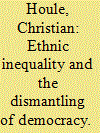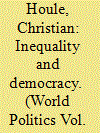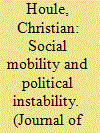|
|
|
Sort Order |
|
|
|
Items / Page
|
|
|
|
|
|
|
| Srl | Item |
| 1 |
ID:
149128


|
|
|
|
|
| Summary/Abstract |
Scholars, observing clustering in transitions to democracy, argue that democratization diffuses across borders as citizens in autocracies demand the same reforms they witness in neighboring states. We disagree. This article demonstrates that diffusion plays only a highly conditional role in democratization. We advance and test an alternative two-step theory of clustered democratization: (1) economic and international political shocks, which are clustered spatially and temporally, induce the breakdown of authoritarian regimes; then (2) democratic diffusion, in turn, influences whether a fallen dictatorship will be replaced by a democracy or a new autocracy. Diffusion, despite playing an important role, is insufficient to explain the clustering of transitions. Using data on 125 autocracies from 1875 to 2004, we show that economic crises trigger authoritarian breakdowns, while diffusion influences whether the new regime is democratic or authoritarian.
|
|
|
|
|
|
|
|
|
|
|
|
|
|
|
|
| 2 |
ID:
139921


|
|
|
|
|
| Summary/Abstract |
Does inequality between ethnic groups destabilize democracies? While the literature largely agrees that inequality harms democracies, previous studies typically focus on the overall level of inequality in a society, leaving unanswered questions about the effect of inequality between ethnic groups. This article fills this gap and argues that inequality between ethnic groups harms the consolidation of democracy but that its effect is strongest when inequality within groups is low. Using group- and country-level data from more than seventy-one democracies and 241 ethnic groups worldwide, the author conducts the first cross-national test to date of the effect of ethnic inequality on transitions away from democracy. Results provide support for the hypothesis: when within-ethnic-group inequality (WGI) is low, between-ethnic-group inequality (BGI) harms democracy, but when WGI is high, BGI has no discernable effect.
|
|
|
|
|
|
|
|
|
|
|
|
|
|
|
|
| 3 |
ID:
091119


|
|
|
|
|
| Publication |
2009.
|
| Summary/Abstract |
Under what conditions do democracies emerge and consolidate? Recent theories suggest that inequality is among the leading determinants of both democratization and consolidation. By contrast, this article argues that inequality harms consolidation but has no net effect on democratization. The author shows that the existing theories that link inequality to democratization suffer from serious limitations: (1) they are useful only for understanding transitions from below and thus do not apply to many other transitions (that is, those from above); (2) even for democratization from below, their predictions are unlikely to hold, since inequality actually has two opposite effects; and (3) they ignore collective action problems, which reduces their explanatory power. However, these objections do not affect the relationship between inequality and consolidation. In particular, while inequality has two opposite effects on the probability of transition to democracy, it unambiguously increases the probability of transition away from democracy. This article conducts the most comprehensive empirical test to date of the relationship between inequality and democracy. It finds no support for the main democratization theories. Contrary to what they predict, estimation suggests neither a monotonic negative nor an inverted U-shaped relationship. Yet inequality increases the probability of backsliding from democracy to dictatorship.
|
|
|
|
|
|
|
|
|
|
|
|
|
|
|
|
| 4 |
ID:
163436


|
|
|
|
|
| Summary/Abstract |
Does social mobility foster political stability? While there is a vibrant literature on the effect of economic inequality on political unrest, the recent literature has remained silent about the effect of social mobility on instability. Yet, inequality and social mobility, although related, are fundamentally distinct, and immobility is likely to be perceived as even more unfair than inequality, meaning that it may generate at least as much grievances. In this article, I argue that social immobility fuels political instability. To test this hypothesis, I develop an indicator of social mobility covering more than 100 countries worldwide. I then conduct the first large-N cross-national test of the effect of social mobility on political instability to date. Consistent with my argument, I find that countries with low social mobility levels are more likely to experience riots, general strikes, antigovernment demonstrations, political assassinations, guerillas, revolutions, and civil wars.
|
|
|
|
|
|
|
|
|
|
|
|
|
|
|
|
| 5 |
ID:
170201


|
|
|
|
|
| Summary/Abstract |
Does democratization diffuse? For over two decades, numerous studies have asserted that democratization diffuses across countries but recent research has challenged this claim. Most recently, work by Brancati and Lucardi has buttressed this null finding by demonstrating that an oft assumed mechanism for the diffusion of democratization—the diffusion of pro-democracy protests—lacks empirical support. We review this contribution in the context of recent research and pose the question: if democratization does not diffuse, then why does democratization cluster in time and space? The answer, we argue, is that democratization occurs in two steps. First, common shocks, economic or political, lead to regime collapse. Then, diffusion does emerge in a second step: new elites are more likely to install a democracy following a regime collapse if neighboring countries have recently democratized. We present evidence from democratic transitions in 125 autocracies between 1875 and 2014.
|
|
|
|
|
|
|
|
|
|
|
|
|
|
|
|
| 6 |
ID:
147836


|
|
|
|
|
| Summary/Abstract |
Does class inequality increase the risk of civil war? I posit that inequality between social classes affects civil wars through two pathways: (1) it heightens the risk of political violence by fueling distributive conflicts; and (2) it reduces structural coup-proofing, which, in turn, increases the capacity of the military to fight insurgents. Combining these effects implies that the net effect of class inequality on civil war is ambiguous. Although class inequality increases the propensity for violence, in unequal countries political violence rarely takes the form of wars because such countries have strong militaries. Class inequality, however, breeds other forms of political violence. In particular, it increases the likelihood of military coups. The two effects of class inequality reinforce each other in the case of coups: inequality simultaneously stirs distributional conflicts and increases the capacity of the military to mount coups by reducing coup-proofing. Using data on 128 developing countries between 1960 and 2008, I find that while class inequality fosters coups, it has no discernible effect on civil wars. I also provide evidence consistent with my causal mechanisms: (1) inequality creates greater threat to the rulers by fueling political instability; (2) inequality reduces structural coup-proofing; and (3) structural coup-proofing increases the likelihood of civil war.
|
|
|
|
|
|
|
|
|
|
|
|
|
|
|
|
|
|
|
|
|